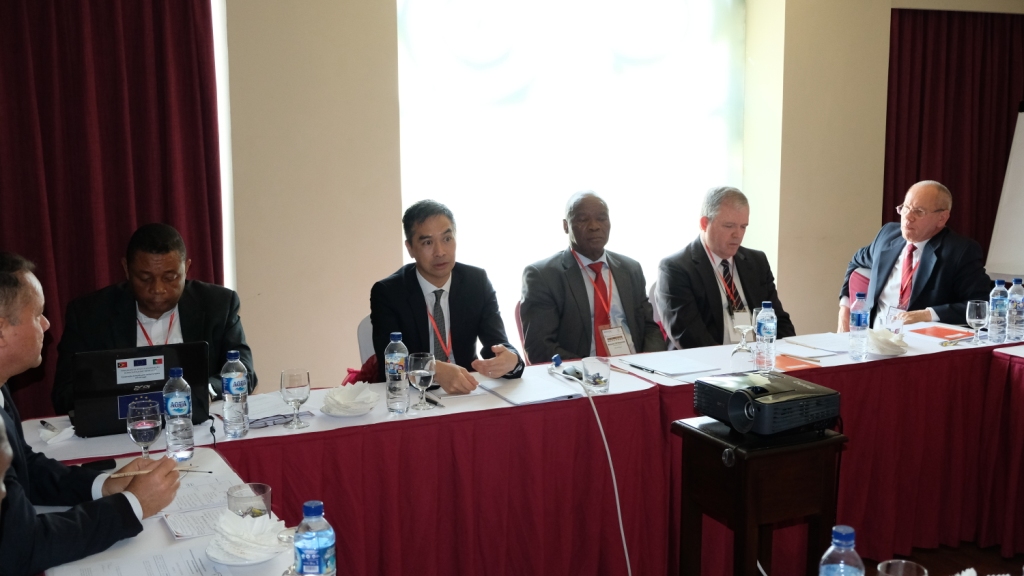The 10th General Assembly of the Supreme Audit Institutions of the Community of Portuguese Speaking Countries (OISC/CPLP) was held in the capital of East Timor, Dili, from 26 to 28 September 2018. The Commissioner of Audit, Ho Veng On, on behalf of the Commission of Audit of Macao SAR Government, attended the assembly as an observer, and discussed the topics related to the theme of the assembly: “The impact of cooperation between public and private institutions on improving the supervision and management work of the Supreme Audit Institutions” with representatives of the Supreme Audit Institutions of Angola, Brazil, Cape Verde, Guinea-Bissau, Mozambique, Portugal, Sao Tome and Principe, and East Timor.
Ho Veng On mentioned the challenges that the external audit work would face, especially the challenges posed by the support of the International Organization of Supreme Audit Institutions (INTOSAI) for the implementation of 17 Sustainable Development Goals in the 2030 Agenda of United Nations, such as the allocation of institutional capacities, the professionalism and the additional mobilization of human resources, the new technologies and other resources.
In order to strengthen the capacities, the Supreme Audit Institution (ISC) can widely apply the International Standards of Supreme Audit Institutions (ISSAI), particularly the important strategy of the ISSAI 12 – “The Value and Benefits of Supreme Audit Institutions – making a difference to the lives of the public”, to the performance audit of the work on the implementation of Sustainable Development Goals, which would underline the importance of the ISC’s implementation of the Supreme Audit Institutions – Performance Measure Framework (SAI–PMF), and also set an example of transparency, high-efficiency and accountability for the public.
Ho Veng On also introduced the situation of China and pointed out that besides drawing up the “China’s National Plan on the Implementation of the 2030 Agenda for Sustainable Development”, China also combines the implementation of the Agenda with the Belt and Road Initiative proposed by the President Xi Jinping in 2013. Until July this year, over 100 countries and international organizations supported this initiative. In August, Xi Jinping emphasized in an activity marking the fifth anniversary of the Belt and Road Initiative that the initiative serves as a solution for China to participate in global opening-up and cooperation, improve global economic governance, promote common development and prosperity, and build a community with a shared future for humanity.
Ho Veng On pointed out that since the construction and opening of Hong Kong-Zhuhai-Macao Bridge, and the implementation of Guangdong-Hong Kong-Macao Bay Area project, the regional interconnection has become closer. Therefore, conducting audit work timely to evaluate the effectiveness, economy and efficiency of the deployment and use of public resources, especially in the major infrastructure projects, will promote good management of public finance.
During the assembly, expert from the German International Cooperation Agency (GIZ), which is one of the INTOSAI partners, was invited to introduce the new pattern of public finance management for participants. The African Organization of English-speaking Supreme Audit Institutions (AFROSAI-E) and the Supreme Audit Institutions of the Community of Portuguese Speaking Countries (OISC/CPLP) are the service target of GIZ.
After generalizing keynote speeches and the outcomes of group discussion, delegations unanimously adopted the “Dili Declaration”.
The General Assembly of OISC/CPLP is held biennially, with the aim to enhance the connection between members of OISC/CPLP and encourage the exchange of opinions and further communication on specific topics and the latest situation. The Commission of Audit has been invited to participate in the assembly as an observer since its establishment, and through the discussion of audit work, it can understand the latest development of international counterparts in audit management.



